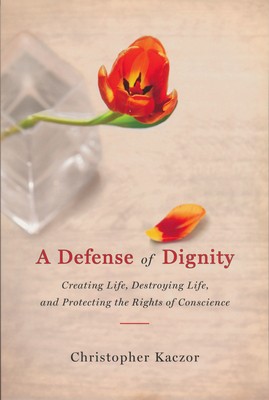
- We will send in 10–14 business days.
- Author: Christopher Kaczor
- Publisher: University of Notre Dame Press
- ISBN-10: 0268033269
- ISBN-13: 9780268033262
- Format: 15.3 x 23 x 1.5 cm, minkšti viršeliai
- Language: English
- SAVE -10% with code: EXTRA
Reviews
Description
Questions about the dignity of the human person give rise to many of the most central and hotly disputed topics in bioethics. In A Defense of Dignity: Creating Life, Destroying Life, and Protecting the Rights of Conscience, Christopher Kaczor investigates whether each human being has intrinsic dignity and whether the very concept of "dignity" has a useful place in contemporary ethical debates. Kaczor explores a broad range of issues addressed in contemporary bioethics, including whether there is a duty of "procreative beneficence," the ethics of ectopic pregnancy, and the possibility of "rescuing" human embryos with human wombs or artificial wombs. A Defense of Dignity also treats issues relevant to the end of life, including physician-assisted suicide, provision of food and water to patients in a persistent vegetative state, and how to proceed with organ donation following death. Finally, what are the duties and prerogatives of health care professionals who refuse in conscience to take part in activities that they regard as degrading to human dignity? Should they be forced to do what they consider to be violations of the patient's well being, or does patient autonomy always trump the conscience of a health care professional?
Grounded in the Catholic intellectual and moral tradition, A Defense of Dignity argues that all human beings from the beginning to the end of their lives should be treated with respect and considers how this belief should be applied in controversial cases.
EXTRA 10 % discount with code: EXTRA
The promotion ends in 22d.21:06:00
The discount code is valid when purchasing from 10 €. Discounts do not stack.
- Author: Christopher Kaczor
- Publisher: University of Notre Dame Press
- ISBN-10: 0268033269
- ISBN-13: 9780268033262
- Format: 15.3 x 23 x 1.5 cm, minkšti viršeliai
- Language: English English
Questions about the dignity of the human person give rise to many of the most central and hotly disputed topics in bioethics. In A Defense of Dignity: Creating Life, Destroying Life, and Protecting the Rights of Conscience, Christopher Kaczor investigates whether each human being has intrinsic dignity and whether the very concept of "dignity" has a useful place in contemporary ethical debates. Kaczor explores a broad range of issues addressed in contemporary bioethics, including whether there is a duty of "procreative beneficence," the ethics of ectopic pregnancy, and the possibility of "rescuing" human embryos with human wombs or artificial wombs. A Defense of Dignity also treats issues relevant to the end of life, including physician-assisted suicide, provision of food and water to patients in a persistent vegetative state, and how to proceed with organ donation following death. Finally, what are the duties and prerogatives of health care professionals who refuse in conscience to take part in activities that they regard as degrading to human dignity? Should they be forced to do what they consider to be violations of the patient's well being, or does patient autonomy always trump the conscience of a health care professional?
Grounded in the Catholic intellectual and moral tradition, A Defense of Dignity argues that all human beings from the beginning to the end of their lives should be treated with respect and considers how this belief should be applied in controversial cases.


Reviews